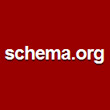 schema.org is a collaboration among the three major search engines Google, Microsoft, and Yahoo! to create a structured data markup schema. Their idea is to ensure the growth of structured markup on the web, and generate better search results that will let users find data more efficiently to most complex queries. Why schema and what are its implications? Let us try to understand?
schema.org is a collaboration among the three major search engines Google, Microsoft, and Yahoo! to create a structured data markup schema. Their idea is to ensure the growth of structured markup on the web, and generate better search results that will let users find data more efficiently to most complex queries. Why schema and what are its implications? Let us try to understand?
- One of the key features of schema.org is its inherent simplicity. It incorporates schemas for more than 100 categories like movies, popular music, TV soap operas, travel, products, places, organizations etc. The partnering search sites are going to work together with the broader web community to expand the categories. They see this as a step forward to simplify things for webmasters and more valuable for consumers to arrive at the right search results.
- On-page markup allows search engine systems to grasp the data webpages and provide more accurate results. They use on-page markup in various ways—for instance, Google utilizes it for creating rich snippets in relevant search results. You can expect usage of more data in more ways over time. Also since publicly accessible from your pages, other compatible organizations may find different new ways to use it as well.
- Instead of having webmasters opt for competing formats, they have now gone for a single format. This will ensure consistency. microdata strikes a better balance between the simplicity of microformats and the extensibility of RDFa, so the engines have gone with it. If you have marked up the content for rich snippets making use of microformats/ microdata/ RDFa, you are already tuned to the process. schema.org functions the same way, employing the microdata markup format plus a vocabulary shared by the top search engines.
- The search engines will still support the current rich snippets markup formats with microformats or RDFa. Though it is perfectly fine to make use of the new schema.org markup or existing microformats/ RDFa markup, avoid mixing the formats on the same webpage together. This may ‘confuse’ their parsers. It is advisable to test the webpages with markup to ensure that search engines can parse the data properly. The rich snippets testing tool can be used for this.
- It is important to know how schema.org relates to Facebook Open Graph that does serves its purpose well, though it doesn’t offer detailed data that search engines require for enhancing the overall user experience. A single webpage may include several components, and may refer to one or more elements.schema.org gives another option for providing additional detail about specific entities on the webpage even if the content for Facebook Open Graph is marked up by you. Each bit of data can easily be represented or denoted as a schema.org type for a better understanding of your content.
Visited 22 times, 1 visit(s) today


Leave a Reply
You must be logged in to post a comment.